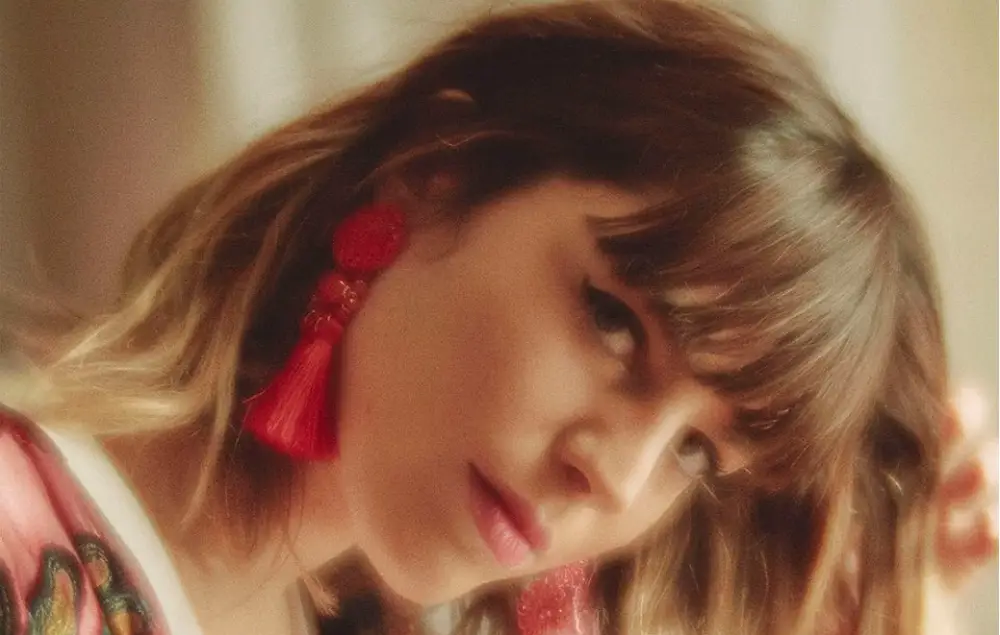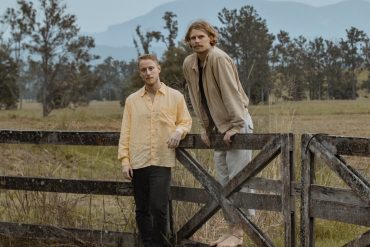Estère’s ‘Archetypes’ sounds particularly mystic and ethereal upon the first play, but listen close and a fog will lift to reveal a deeply human album full of life lessons, mythical stories, personal growth, and self-reflection.
Stream: “Into the Belly of Capricorn” – Estère
I like the idea of a universal concept like Archetypes being a vessel through which the humanity of the album can be discovered.
Estère’s third album sounds particularly mystic and ethereal upon the first play, but listen close and a fog will lift to reveal a deeply human album full of life lessons, mythical stories, personal growth, and self-reflection. A bewitching musical immersion, Archetypes soars on divine wings as Estère delves into philosophy and existential exploration on a record that refuses to confine itself to any single sound, style, or genre.

Still in the nature angels fall
You are the breath
With which I call
Empty handed, unafraid
You came back
To stake your claim
Take my hand
And we’ll go dancing
Into the belly of Capricorn
With the wind under our sails
We’ll take all of our chances
Into the belly of Capricorn
First I went to reject you
Threatened by your simple truth
You held up your pure palms
Tattooed with a billion hearts
Released January 22, 2021 via Blue Riot Records, Estère’s enthralling third LP is as intoxicating as it is thought-provoking, if you’re willing to open up to what it has to say. Active since the early 2010s, Wellington, New Zealand based producer and songwriter Estère has been a mainstay of her local scene for years now, and while she saw relative success with 2015’s debut Estere and 2018’s follow-up My Design, on Others’ Lives, it’s with her third full-length record that the artist realizes her fullest vision yet.

“I was interested in making a concept album and around that time I had been introduced to the idea of archetypes through talking with my grandmother,” Estère tells Atwood Magazine. “Things just caught fire from there and I became quite consumed with learning about the world of Archetypes.”
A part of Carl Jung’s psychology often referred to as “Jungian archetypal theory,” Jungian archetypes are universal symbols and images that derive from the collective unconscious. He defined them as the psychic counterpart of instinct – an innate knowledge that directs conscious human behavior. While archetypal psychology has plenty of dissidents who see it as more mystical than realist, it has been applied in modern psychology, marketing, and throughout literature and entertainment.
Estère dives deeper into this throughout her album, which to some degree explores eleven different archetypes – one for each song, opening with “Into The Belly of Capricorn” and the child archetype, and ending with “Won’t Shy Away” and the archetype of the self. “I like the idea of a universal concept like Archetypes being a vessel through which the humanity of the album can be discovered,” Estère says.

Musically, Estère has previously been given the label “electric blue witch-hop.” Her new record strays from this eclectic wordplay, blending pop, R&B, and folk elements into an accessible, yet nonetheless unique and singular sonic footprint.
“I wanted a sound aesthetic that took elements from different music that inspires me and mashed it together in a unique way,” the artist says. “I also wanted to put a lot of attention towards the songwriting. Beats and rhythms played more of a second fiddle than in my previous other work, which I wasn’t initially expecting.”
Comparing Archetypes to its two predecessors, Estère recognizes her own transformation and musical maturity. “I think it shows an evolution,” she reflects. “I’ve been told it sounds very different from my previous work. I wanted to be braver with my songwriting for this album – I think at the moment my artistry is definitely going towards taking creative risks. The arrangements were done in pre-production as well as in the studio with the co-producer Stew Jackson. The direction of the arrangements came organically and often were fleshed out quite a bit once we came to each song in the studio.”
Archetypes has something for everyone – from immersive ballads (“Mad About Your Sea,” “Won’t Shy Away”) to tight, driving pop songs (“Animal Pleasure,” “Nemesis”), to songs that don’t fit our traditional modes of categorization (“The Climate in Your Skull”), Estère seems to find the perfect balance between emotion and intuition, control and impulsivity.
Her guitar work on the songs “Pelican” and “Animal Pleasure” is particularly entrancing: “I wrote both of those songs acoustically, and I knew that for ‘Animal Pleasure’ I wanted a Rosalia inspired clap beat,” Estère notes, “but for ‘Pelican’ I wanted the acoustic/ folkloric aspect to be highlighted. We just worked within those parameters. ‘Pelican’ is one of the songs closest to my heart. I wrote it while I was in Paris – I spent days in the apartment I was in just picking out that guitar line. It feels like an old companion.”
Meanwhile, she highlights the soaring “Red Riding Hood” as a source of some of her favorite lyrics: “I do really like singing, ‘The hooded thirsty girl in the blood red blazer kissed a wolf who longed for love,’“
Through the forest where sun shines pale
And leaves rot under footed trail she wandered
The smell of fur, a shadow brief
She turned to see the hunted beast revealed
His eyes were alpine, gaze remote
She clutched the threshold of her throat to plead
She said perhaps you came to eat me dead
But there’s one thing that I wish instead
The hooded thirsty girl in the blood red blazer
Kissed a wolf who longed for love

Favorites aside, Archetypes presents itself as a intimate exploration full of mythos and folklore, yet definitively rooted in humanity.
“I want people to feel a connection to nature and to the strange wonder of their own humanity when they listen to the album,” Estère shares. “I am so grateful to have been able to make Archetypes, it taught me a lot – even just about my own philosophical ideas and approach to life.”
Maybe the reason this record feels otherworldly upon first listen is merely because we’re disconnected from ourselves. Diving into this music might help us better connect – not only to ourselves, but also to our surrounding world. Experience the full record via our below stream, and peek inside Estère’s Archetypes with Atwood Magazine as she goes track-by-track through the music and lyrics of her third album!
I want people to feel a connection to nature and to the strange wonder of their own humanity when they listen to the album.
— —
:: stream/purchase Archetypes here ::
Stream: ‘Archetypes’ – Estère
:: Inside Archetypes ::

— —
Into The Belly of Capricorn
Child Archetype
This song is about meeting my own inner-child as a separate mythical entity. It’s about reclaiming the essence of who I am, shedding the protective layers that adulthood can encased me in – before I turn into a shell.
Pelican
Mother Archetype
This song is a story of two boys who drown after taking a small paddle boat onto a river that sweeps them out to sea. Their mother endeavours to save them by turning into a pelican to search for their bodies and ultimately sacrifices her own life for theirs. It’s based on ‘sacrifice of the mother’ and the ancient Egyptian myth that pelican mothers would use their beaks to stab their own hearts to nourish their young.
Calculated Risk
Suppression of Desire Archetype
Calculated Risk is song about being scared to take risks for fear of failure. It’s based on the idea that throughout time women have been discouraged to be inquisitive ‘try-ers’ because their curiosity always leads to …well destruction. Take Eve with the apple, Persephone with the Pomegranate, Pandora with the box as some prime examples.
Climate In Your Skull
Mental Illness Archetype
This song is about recognising a friend’s struggle with mental health. On a broader note it touches on the impact of climate change on all of our mental health.
Mad About Your Sea
Addiction Archetype
Mad About Your Sea is about being addicted to someone destructive who is no good for you. It’s about the agony of wanting to keep close to that person and to help them, despite the pain it causes you.
Animal Pleasure
Sexuality Archetype
This song is about recognising my own sexual instinct as a woman and acting upon it without fear or shame. I think that there is an animalistic part in all of us – but that we are often pressured to engage with our sexuality in a standardised – socially acceptable way.
Night Crow
Death Archetype
This song is about lamenting the shadow of death in life. It’s about a plague that has taken the family of the character singing the song.
Red Riding Hood
This is a reimagined story of Red Riding Hood inspired by the author Angela Carter. It reclaims the agency of Red Riding Hood as a woman who takes the wolf as her lover – and wants/ chooses to be devoured by him. As opposed to a victim who is attacked and devoured by him. It is instead the huntsman, that is the villain – wherein he is too
Nemesis
Envy Archetype
This song is based off a girlfriend being jealous of an ‘ex’ that is back in town. It actually refers to me personally, wherein I was Nemesis to another woman for a while.
Pomegranate
The Search for God Archetype
Pomegranate is about being sad about a good friend on a spiritual journey who has lost touch with the real world and those closest to them.
Won’t Shy Away
Archetype of the Self
Is about finding comfort, safety and equilibrium with myself when by myself, and recognising that sometimes being with other people, and in intense relationships can distract you from that state.
— —
:: stream/purchase Archetypes here ::
— — — —

Connect to Estère on
Facebook, Twitter, Instagram
Discover new music on Atwood Magazine
? © Bayly and Moore
:: Stream Estère ::








